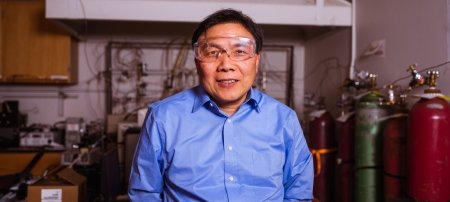Michigan Tech Collaborates on $4 Million Department of Energy Project

Michigan Technological University is one of three colleges and universities that will collaborate with the biotech-based alternative fuels and chemical company LanzaTech on a $4 million research project. They will work to find ways to convert waste methane into low carbon fuels and chemicals.
Funding for the 3-year research project comes from the US Department of Energy’s Advanced Research Projects Agency-Energy (ARPA-E).
Chemical Engineering Professor David Shonnard will lead the research at Michigan Tech, with Robert Handler providing technical and program management support. Shonnard is director of the University's Sustainable Futures Institute (SFI) and holds the Richard and Bonnie Robbins Chair in Sustainable Materials. Handler is SFI operations manager.
Louisiana State University (LSU) and City College of New York (CUNY) are the other schools collaborating on the research.
LanzaTech’s goal is to extend its core fermentation technology and produce fuels and chemicals more efficiently, economically and at a smaller scale. Michigan Tech’s role is to work with LanzaTech engineers and scientists to determine the environmental impacts of a novel pathway for producing ethanol from stranded methane emissions.
“The Sustainable Futures Institute at Michigan Tech has worked with LanzaTech and many other innovative alternative-biofuels companies to assist in their research and development efforts, their pilot projects and commercial developments by providing a comprehensive understanding of their product systems from an environmental viewpoint,” Shonnard said. “We look forward to this new project as one more in a long line of collaborations with LanzaTech.”
LanzaTech will provide expertise in gas fermentation; the CUNY Energy Institute will offer reactor design with experimental reactor design expertise; and LSU will render reactor modeling capabilities.
The new design will enable the technology to be used with other carbon-rich waste resources, including carbon monoxide, carbon dioxide and hydrogen. It should enhance emission reduction capabilities across various industries.
The $4 million grant is part of ARPA-E's $34 million REMOTE (Reducing Emissions using Methanotrophic Organisms for Transportation Energy) program, aimed at upgrading transformational bioconversion technologies to produce transportation fuels cost effectively.
Michigan Technological University is an R1 public research university founded in 1885 in Houghton, and is home to nearly 7,500 students from more than 60 countries around the world. Consistently ranked among the best universities in the country for return on investment, Michigan's flagship technological university offers more than 120 undergraduate and graduate degree programs in science and technology, engineering, computing, forestry, business, health professions, humanities, mathematics, social sciences, and the arts. The rural campus is situated just miles from Lake Superior in Michigan's Upper Peninsula, offering year-round opportunities for outdoor adventure.




Comments